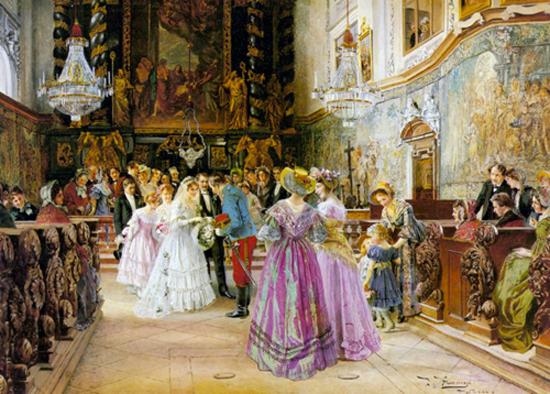
I, take thee, to be my lawful wedded wife, to have and to hold from this day forward,
for better for worse, for richer for poorer, in sickness and in health, to love and to cherish, till death us do part, according to God's holy ordinance; and thereto I plight thee my troth.
Sounds like a fairytale, doesn't it? Historical romance authors, if they follow the rules, end books in similar ways giving the "HEA" ending to readers. Who wants to read about divorce in a romance novel? However, I'm a diehard researcher that always has to look at a situation from every angle, so I took the time to discover the truth about marriage and divorce.
My research regarding divorce laws in France and England reminded me of that phrase we often say, but don't really adhere to in the 21st century - "until death do us part." Let's move the romance aside for a moment and take a look at the reality of 19th century marriage and divorce. I discovered the following in my hours of researching the topic from a moral, religious, and civil law perspective.
Marriages in the Victorian era fell into three categories: (1) those contracted for convenience; (2) those produced by sympathy or love; and (3) those entered into from duty. The aristocracy put great importance on the background and nobility of the families they married into, as well as marrying for money. Though love in marriage might be ideal, it was not a practical reality, and people were told not to expect too much from marriage. If you found an ounce of happiness in your union, rejoice.
So what about unhappy marriages? Divorce was not easily obtained. Extramarital sexual relations were a normal feature of life in troubled relationships. After marriage, adultery was almost inevitable. Adultery, believe it or not, was preferred to divorce, mainly because divorce was difficult and expensive to obtain. Men had sex with their wives for children, and bedded their mistresses for love and pleasure. A wife had the duty to obey her husband and produce heirs, and in return for her obedience, the husband owed her protection and security.
Divorce in England and France evolved over the years, coupled with Catholic and Anglican restrictions. A married woman in France needed two causes for divorce - adultery and physical cruelty. Adultery alone was not grounds for divorce for a woman. However, a man could divorce his wife for adultery only.
To file for divorce in France, a petition had to be brought before the president of the chambers, and there had to be two attempts before the court to reconcile the marriage. If the marriage failed to reconcile, then court proceedings would continue. Upon the divorce, the children would go to the custody of the husband. After 1886, custody was left at the discretion of the court. The wife had to take back her maiden name and was forbidden to keep her husband's name. The husband could remarry immediately after the divorce became final, but the wife had to wait ten months after the dissolution before she was allowed to marry again.
In Victorian England, the rules were similar. "The husband could obtain a divorce for adultery, the wife could obtain a divorce for adultery coupled with cruelty or desertion for two or more years, and also for incestuous or bigamous adultery, or rape, or unnatural offenses." (The Encyclopedia Britannica: Volume 3, Google Books) Divorce could be a lengthy and costly process that only the rich could afford.
Of course, civil laws did not govern church laws. Catholics could not divorce and remain in good graces with the church, and surely Anglican and other protestant branches held the same views. Holy matrimony was just that - a holy union not to be broken. The alternative of adultery to divorce was a matter of sin and one's conscience. Even though France was predominantly Catholic, the church turned a blind eye to the infidelity of the male Frenchman.
Our modern day divorces are much easier to obtain. Though we may utter those words "until death do us part," they don't really carry the serious consequences of marriages long ago. Perhaps that is why readers insist on a happily ever after as a perquisite to a good historical romance. The reality of being chained to a marriage without love for the sake of convenience, law, or religious conscience must have been an unhappy existence. As Jane Austen would say:
"Happiness in marriage is entirely a matter of chance."
Happily Ever After,Vicki
